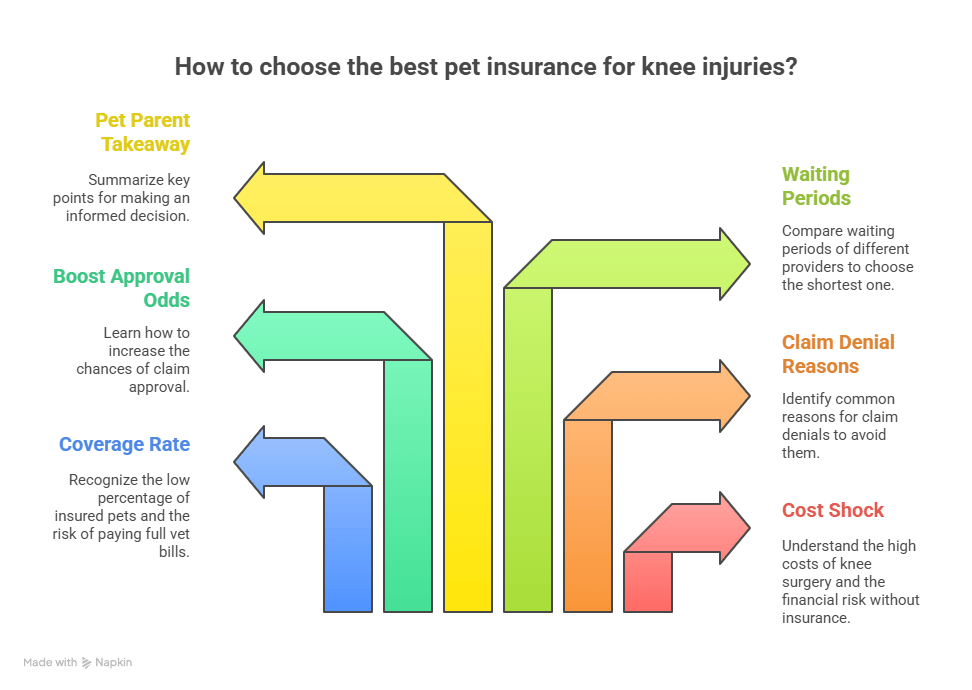When your dog suddenly limps, your heart drops before your brain can process the math. An ACL or CCL tear, the dog equivalent of a torn knee ligament, means surgery, months of rest, and vet bills that often climb into the $6,000–$10,000 range per leg. For most families, that’s a financial earthquake.
That’s where pet insurance is supposed to help. But if you’ve ever read reviews, you know the truth: some pet parents walk away relieved, while others face denials that leave them paying every dollar themselves. The difference? Fine print, timing, and how your claim is documented.
At PetCoverage.ai, we help pet parents decode policies before disaster strikes. We review your coverage, flag hidden exclusions (especially around orthopedic issues and dog knee issues), and coach you on how to file claims so they’re more likely to be approved.

The Gut Punch: One Limp, One Bill, and a Maze of Fine Print
A torn CCL (cranial cruciate ligament) is the most common orthopedic injury in dogs. The standard fix, TPLO surgery, is highly effective but expensive. Depending on your region and aftercare, estimates range from $2,900 to over $10,000 for a single leg.
Without insurance, that entire cost is yours. Yet in the U.S., only about 2% of Americans have pet insurance for their dogs or cats, leaving the vast majority of pet parents financially exposed. With insurance, coverage hinges on when you bought the plan, what your vet had previously noted, and how your insurer defines “pre-existing” or “bilateral” conditions. Reviews show these details decide whether you’re protected or left scrambling.
What real pet parent reviews say about knee claims (good, bad, and fixable)
When it comes to dog knee injuries, like ACL or CCL tears, the difference between peace of mind and a financial nightmare often comes down to how each insurer handles claims. Reviews from real pet parents reveal a mix of fast reimbursements, tricky waiting periods, and fine-print exclusions. Here’s how the major players compare:
Trupanion
Many dog owners report smooth experiences with Trupanion. One 2025 reviewer shared that the company approved an emergency ACL surgery quickly, calling the approval process “top notch.” Another pet parent only paid about 10% of a $5,500 CCL surgery bill, thanks to their policy.
But there’s a catch: Trupanion applies an 18-month look-back rule. If your dog had any same- or opposite-leg issues noted within that window, the claim could be denied as “pre-existing.” While they don’t add extra waiting periods beyond the standard 5-day accident and 30-day illness rules, history matters. Still, some owners say appeals supported by detailed vet letters have successfully overturned denials, proof that persistence pays off.
Healthy Paws
Healthy Paws is often praised for fast reimbursements on TPLO claims and for easing stress during the recovery period. Pet parents say the claims process feels straightforward, and money comes back quickly.
The trade-off? Expect careful medical record reviews before approval, and note that premiums tend to rise sharply as your pet ages. While coverage can be strong, the long-term cost is something owners flag repeatedly.
Spot
Spot stands out for speed and convenience. Reviews highlight quick reimbursements and an easy-to-use app for filing claims.
Where Spot really shines is with waiting periods: many policies list just 14 days for cruciate ligament injuries, far shorter than the 6 months required by many competitors. This makes Spot an attractive option for pet parents who want coverage in place without a long delay. Still, waiting periods vary by state, so double-check your policy.
Embrace
Pet parents often praise Embrace for responsive customer service and a positive claims experience overall.
That said, their orthopedic waiting periods vary by state and condition. For dog knee issues, this can stretch into months. Some owners in forums share mixed results on knee surgery approvals, underscoring that timing and documentation make or break the claim.
Prudent Pet
Prudent Pet is clear-cut: most states impose a 6-month waiting period for knee and ligament conditions. However, if you complete a vet orthopedic exam early in the policy, you may qualify for a waiver. Owners who follow this step tend to have smoother claim approvals.
Lemonade
Lemonade’s reviews show strong digital convenience, but the timing rules are strict. Expect about 30 days for orthopedic conditions and 6 months for cruciate ligament injuries (with state-specific exceptions). If you plan to use Lemonade for knees, coverage is possible, but you’ll need to set it up well in advance.
The Bottom Line From Reviews
Across all providers, one message is clear: knee claims do get paid, and often quickly, when you set up coverage early and keep medical records clean. Pet parents who had success usually did three things right:
Waited out the policy’s knee waiting period before an injury occurred.
Had no prior notes of knee or hip problems in their vet records.
Submitted detailed vet documentation showing the injury was a new, acute incident.
In other words, the brand matters, but your timing and paperwork matter just as much.

Case Study: “Lucy’s Limp Turned Into Surgery, And Insurance Paid”
Lucy, a 4-year-old mixed breed, went from weekend zoomies to a sudden limp. Her vet diagnosed a cranial cruciate ligament (CCL) tear and recommended TPLO surgery. Luckily, her pet parent had chosen a plan with shorter knee waiting periods (similar to Spot’s 14-day policy in many states).
Because Lucy’s medical records showed no prior knee problems and the injury was clearly documented as new and acute, the claim was approved quickly. Reimbursement came through within days, covering the bulk of the $5,000+ surgery bill.
This story echoes what we see in many reviews: when policies are set up early, records are clean, and documentation is complete, knee claims go smoothly.
At PetCoverage.ai, we help pet parents build this kind of coverage safety net, so if your dog ever faces a knee injury, you’ll be ready.
Warning: The Three Fastest Ways to Get Denied on a Knee Claim
Positive reviews are real, but so are horror stories. Most denials trace back to a handful of common mistakes:
Buying insurance after symptoms appear: Any limp, even mild, documented before enrollment or during the waiting period, counts as pre-existing.
The bilateral clause trap: If one knee was noted before coverage, the opposite knee may be excluded later. This is a common and devastating surprise for pet parents.
Vague medical records: Claims get delayed or denied when vet notes don’t clearly link the injury to a new incident. Owners who succeed on appeal usually submit detailed letters from their vets explaining the cause.
How to Build a Knee-Smart Insurance Plan
To avoid those pitfalls, build your policy around the real risks of orthopedic issues in dogs.
Set high enough annual limits: TPLO plus diagnostics and rehab can run $6k–$10k+. Choose a limit that won’t leave you short.
Opt for higher reimbursement rates: 80–90% reimbursement saves thousands on knee claims.
Check orthopedic waiting periods: Shorter waits (like Spot’s 14 days) are far safer than 6 months.
Add recovery coverage: Extras like rehab, hydrotherapy, or PT coverage help after surgery and fall under urgent care for orthopedic issues in many policies.

Frequently Asked Questions (FAQs)
1. Will pet insurance cover TPLO?
Yes, if your plan covers accidents/illnesses, the waiting period is over, and there’s no prior knee issues in dogs flagged in records (including bilateral rules). Always confirm the knee/cruciate clause in your policy.
2. What if my dog had a “mild limp” last year?
That note can be treated as pre-existing or trigger bilateral exclusion later. Send us the records, we’ll tell you how a carrier is likely to read it.
3. Which providers are fastest on knee claims?
Speed varies case-by-case, but recent public reviews praise Spot (easy app), Trupanion (quick ACL approvals in some cases), and Healthy Paws (fast TPLO reimbursements). Your documentation and timing still decide outcomes.
4. How long do I need to wait before knees are covered?
Depends on carrier/state: some 14 days, some 30 days ortho, and some 6 months for cruciate. Don’t guess, check your policy.
5. Are wellness add-ons worth it for knee issues?
They don’t cover surgery, but they can offset routine costs. For knee cases, focus first on core illness/accident coverage, annual limits, and shorter ortho waits.
Key Takeaways
In wrapping up our look at what reviews reveal about dog knee surgery and pet insurance, one truth stands out: coverage details decide whether you’re protected or paying out-of-pocket. Here are three actionable insights:
Knee Surgery Is Expensive: TPLO procedures often cost $6,000–$10,000+, making insurance critical for financial protection.
Fine Print Rules the Outcome: Waiting periods, bilateral clauses, and pre-existing condition definitions are what determine if your claim gets paid.
Act Early, Not After the Limp: Enroll while your dog is healthy, get baseline exams on record, and choose a plan with orthopedic coverage that starts sooner rather than later.
We’ve highlighted real reviews, a case study, and the traps to avoid so you can see how preparation transforms denials into approvals.
Upload your policy to PetCoverage.ai for a free knee-risk review, fast, clear, and pressure-free.
To stay updated on pet insurance tips and trends, follow us on Facebook, Instagram, TikTok, and LinkedIn.






